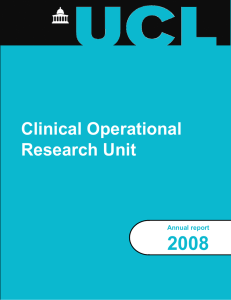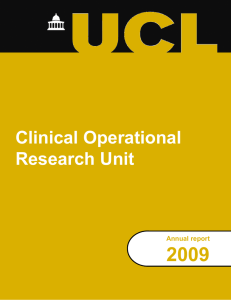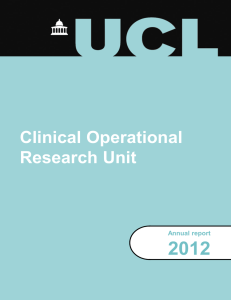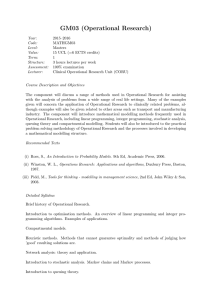2007 Clinical Operational Research Unit
advertisement
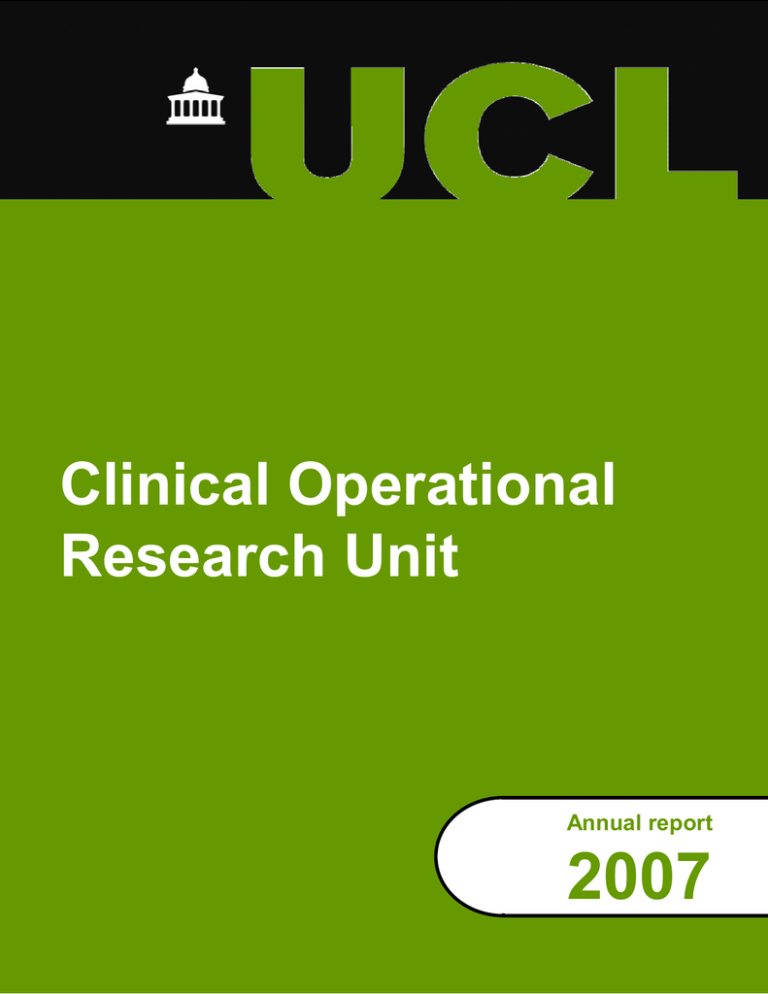
Clinical Operational Research Unit Annual report 2007 Contents Introduction..................................................... 3 The team......................................................... 4 Example research projects in 2007................. 6 Publications in 2007........................................ 9 Forthcoming publications................................ 12 Selected presentations in 2007....................... 15 Working with the best: our collaborators......... 16 Our sources of income.................................... 16 2 Introduction Welcome to the 2007 annual report of the Clinical Operational Research Unit (CORU) at University College London. CORU is a dedicated team of researchers that applies mathematical modelling and other operational research techniques to problems in healthcare. For those not familiar with our work, notable achievements in the past include the development of probability techniques related to the progression of patients' disease. Such techniques have been used extensively, particularly in relation to evaluation of cancer screening programmes, and now underpin much health economic modelling. Another of our important contributions has been the development of an audit method called VLAD, which is now used in cardiac surgery units throughout the UK and abroad. Besides achieving a reputation as one of the world’s leading centres for healthrelated operational research, the unit has an enviable publication record in clinical journals. Key to the success of the unit is our problem solving ethos and the fact that we work closely with leading clinicians. This ensures that we tackle problems of relevance to the NHS and that our research is informed by the insight and experience of those directly involved in delivering health services. The majority of our research activity falls into four broad themes: evaluating clinical outcomes, patient safety, the health of women and children, and NHS service delivery. As can be seen from our list of publications for 2007, contained within these themes is a great diversity of health care problems in a number of clinical specialties. For a group of operational researchers, becoming familiar with such a range of clinical topics and environments is a challenge, albeit a hugely enjoyable one. That said, one of the great advantages of the broad range of operational research techniques and mathematical methods we employ in our research is that they do not respect clinical boundaries. It is this broad applicability of operational research methods coupled with the knowledge and focus of a network of clinical collaborators that makes a research unit in the mould of CORU such a unique and valuable asset to health research in the UK. Our research is relevant, useful, topical and, being free of the need to gather data, very cost effective. In addition to lots of useful research, 2007 saw a number of changes within CORU. Professor Steve Gallivan stepped down as Director of CORU after 12 years of outstanding service and took up a new role dedicated entirely to the pursuit of research. Also, having collaborated with CORU for over two decades, eminent surgeon Professor Tom Treasure joined the unit. We are already benefiting tremendously from having his vast clinical experience and research expertise as an intrinsic part of the team. I hope that you find this report of interest. Should you have any questions concerning CORU or our research, please do get in touch. Martin Utley, Acting Director 3 The Team Dr Martin Utley Professor Tom Treasure Currently Acting Director of the unit, Martin joined CORU in 1996 having gained a PhD in high-energy physics. Martin is actively involved in all of CORU's current research. His main interest lies in providing insight and high quality information to those planning, delivering or evaluating health services. Committed to this aim, Martin also acts as a scientific advisor to the National Confidential Enquiry into Patient Outcome and Death (NCEPOD). Tom joined CORU in the summer of 2007 following a long and successful career as a cardio-thoracic surgeon. Tom has worked with CORU on research topics of mutual interest for over two decades. Now, in his honorary role, Tom contributes his considerable knowledge and clinical experience to ongoing projects concerning outcomes following surgery and hospital acquired infections as well as continuing to conduct his own research. Professor Steve Gallivan Dr Christos Vasilakis Steve has been active in operational research for over 25 years and served as Director of CORU between 1995 and 2007. Since April 2007, he has been devoting his time at CORU to a variety of ongoing projects. After gaining his PhD in pure mathematics, he started his OR career in traffic engineering and transport planning, before transferring his skills to the clinical sector. He has over 200 publications to his name, and is always looking for new ways of using mathematical methods in useful applications. Steve also acts as a scientific advisor to the NCEPOD. Christos has an academic background in both operational research and computer science, and has more than ten years of experience as a researcher in health systems. After a number of years lecturing at another London University and having spent a year in Vancouver as a post-doctoral fellow, Christos joined CORU in August 2007 as a Principal Research Fellow. He is currently working on projects related to hospital acquired infections and how best to involve clinicians in the development of simulation models. Dr Christina Pagel Professor Ray Jackson Ray's long career bridges the worlds of academia, government and business. Having worked in OR for multi-national companies, the Department of Health, and the Universities of Southampton and Warwick, he became the founding Director of CORU in 1983. He retired in 1995, but maintains a consultant role within the unit. Christina has a background in both mathematics and physics, gaining her PhD in space physics in 2002. After continuing in physics for 3 years as a Research Fellow in Boston, she decided to make the transition into operational research applied to health care and joined CORU in October 2005 as a Research Fellow. Christina is currently working on projects related to common mental health problems, congenital heart surgery and pharmacy safety. 4 Dr Francesca Fiorentino Francesca has a background in both physics and mathematics, gaining her PhD in mathematics applied to epidemiology in 2004. After working for The Environment Agency as a modelling officer, she joined CORU in May 2007 as a Research Fellow. Francesca is currently working on projects related to hospital acquired infections. Mr Brian Reddy Having completed an undergraduate degree in Management Science and Information Systems Studies, Brian conducted research into the use of the Irish language in business before moving to London to obtain an MSc in Decision Sciences from the London School of Economics. Brian joined CORU in October 2007 as a Research Fellow and is currently working on projects related to thoracic surgery. Mrs Mary Gallivan human resources for Hammersmith Hospitals NHS Trust. Since retiring from the NHS, Mary has undertaken short term consultancy work on behalf of the unit in her roles as an Honorary Research Fellow. Her in-depth knowledge of the NHS and of hospital management is invaluable to the unit. Mr Chris Sherlaw-Johnson With an academic background in mathematics and operational research, Chris spent many years at CORU working on a variety of projects. Now leading a team within the monitoring and surveillance division of the Healthcare Commission, Chris retains active research links with CORU in areas of mutual interest and is an Honorary Senior Research Fellow within the unit. Mrs Joanne English Joanne acts as both PA to the Director and as the unit administrator. She joined CORU in 2002. Mary is a trained nurse who worked for several years as Assistant Director of Contact details Clinical Operational Research Unit Telephone: +44(0)20 7679 4509 4 Taviton Street Fax: +44(0)20 7813 2814 London Email: m.utley@ucl.ac.uk WC1H 0BT j.english@ucl.ac.uk CORU is hosted by the UCL Department of Mathematics within the Faculty of Mathematics and Physical Sciences. 5 Example research projects in 2007 CORU conducts research on a wide range of topics. Some of the research projects that the unit was engaged in during 2007 are described below. Non-adherence to medication: assessing the potential harm to patients A considerable amount of research attests to the fact that errors in the administration of drug therapy are frequent. Such errors include delays in the administration of medications within hospital, administration of the incorrect dose or of the wrong drug or omission of scheduled administrations, either through errors within the health care system or through forgetfulness on the part of the patient. Although the level of such errors is frequently measured, the potential harm to patients has not been well quantified. Working with world-renowned researchers in this field from the London School of Pharmacy, we are developing mathematical models that link standard pharmacokinetic models with stochastic analysis and models of patient behaviour. The aims of our work are to quantify the potential harm associated with non-adherence to medication and to generate insights into the complex relationship between health care systems, biological systems and patient behaviour that can be used to reduce or to ameliorate the harmful effects of nonadherence to medication. See publications 9, 35, 36, 39 The monitoring and reporting of surgical wound infections Hospital acquired infections such as MRSA are a major concern for clinicians and for the public. As part of our work in the area of improving patient safety, we are working with microbiologists at University College London Hospital to develop practical tools to assist with the monitoring and reporting of surgical wound infections. We aim to provide clinicians with an early-warning system that will help identify, in a timely fashion, trends in infection rates and also to standardise and automate the reporting of the occurrence of surgical wound infections to clinical teams. By alerting clinicians to potential problems, the hope is that this work will result in a reduction in the number of surgical wound infections and, consequently, save many lives and reduce postoperative morbidity. See publications 4, 15, 19 Modelling the impact of errors in databases on clinical governance True number of deaths Recorded number of deaths Data collation True number of survivors Recorded number of survivors Records lost For many good reasons, the quantitative analysis and reporting of clinical outcomes is viewed as an increasingly important activity within the UK health care system. Given that it is widely accepted that large clinical databases will, almost inevitably, contain errors, CORU is conducting research into how this fact is likely to affect the accuracy of 6 conclusions drawn from analyses of these data. Mathematical modelling techniques have been used to establish that relatively modest levels of erroneous data can lead to grossly inaccurate estimates of mortality rates, particularly for clinical interventions associated with low mortality rates. As a result there are plausible circumstances in which errors in clinical databases could potentially lead to serious misinterpretation of clinical performance, undermining the intentions of audit and good clinical governance. This work is being conducted in collaboration with surgeons from Great Ormond Street Hospital for Children and the Hospital for Sick Children in Toronto, Canada. See publications 22, 31, 38 Mathematical modelling to assist the restructuring of primary mental health care services U Novel mathematical models of the flow of people through systems composed of different clinical processes are being used to determine the best allocation of resources between different treatment modalities. The tools developed during this project will be evaluated with the expectation that they will be made available to services across the UK. See publications 30, 41 Assisting the work of NCEPOD Members of CORU act as Scientific Advisors to the National Confidential Enquiry into Patient Outcome and Death (NCEPOD), an organisation dedicated to improving clinical outcomes through the production of research reports, which are based on confidential summaries of cases provided by practicing surgeons, anaesthetists and physicians. We assist NCEPOD in the design of studies and in the analysis and reporting of data. Additionally, the voting system used by the steering group of NCEPOD to select topics to study was devised by CORU. See publications 12, 24, 25, 26 The recent comprehensive spending review undertaken by the Government underlined the priority attached to improving access to therapy services for people with common mental health problems such as anxiety and depression. In many parts of the UK, such services are being re-organised in order to comply with guidelines for improving access to psychological therapies produced by the National Institute of Clinical Excellence (NICE). Along with academic partners from the University of York and The University of Manchester, we have been working with four primary mental health care trusts to develop tools to assist with the reconfiguration of services. Methodological problems in safety research RTA death Road traffic accident (RTA) data Time RTA minor injury RTA serious injury The design and evaluation of safety improvement programmes are sometimes based on the premise that introducing effective measures to combat minor incidents will necessarily reduce the incidence of major incidents involving substantial harm. It is claimed that there is a fixed ratio between the 7 incidence of no harm incidents, minor incidents and major incidents (a concept known as the Heinrich ratio). In collaboration with the London School of Pharmacy, CORU carried out a project on behalf of the National Patient Safety Agency (NPSA) to investigate the applicability of the Heinrich ratio in relation to pharmacy safety. Thought experiments showed that the principle of a fixed Heinrich ratio has a dubious logical foundation. Analysis of several studies concerning medication errors showed a marked variation in the relative incidence of medication errors of different severities. Triangle plots of UK road traffic accident data revealed a hitherto unrecognised systematic pattern of change over time in the relative incidence of different severities of accident, in direct contradiction of the principle of the Heinrich ratio. See publication 43 The surgical removal of pulmonary metastases in colorectal cancer patients image courtesy of Dr Sally Barrington The surgical removal of pulmonary metastases in patients with colorectal cancer has become common practice. However, there is scant evidence of its clinical benefits. We are engaged in a programme of research to challenge the evidence cited in support of this practice and to provide better evidence as to whether surgery confers benefit that outweighs the harmful effects of the operation. See publications 2, 16, 18, 32, 34 Risk-modelling in congenital heart surgery Expected – actual deaths 30 25 20 Outcomes a lot better than predicted 15 10 5 0 -5 0 -10 -15 -20 Outcomes as predicted 400 Case number 800 Outcomes a lot worse than predicted Audit and clinical governance in adult cardiac surgery have benefited greatly from the existence of a widely accepted model for the risk of peri-operative death and tools developed within CORU for monitoring risk-adjusted outcomes. No widely accepted risk model exists for use in congenital heart surgery, a very challenging clinical area in which to build such models due to the great diversity in diagnoses, co-morbidities and surgical procedures that exist. CORU is working with congenital heart surgeons at Great Ormond Street Hospital for Children to assess a locally developed risk model and to establish the feasibility of the routine adjustment of surgical outcomes for case mix. Plans are in place to collaborate with the Central Cardiac Audit Database such that UK-wide data can be used to ensure that the tools developed have applicability across different surgical units. 8 Publications in 2007 Copies of all publications are available on request. 1. Gallivan S, Utley M, Jit M, Pagel C. (2007) A computational algorithm associated with patient progress modelling. Computational Management Science. 4(3):283299 2. Treasure T, Utley M, Hunt I. (2007) When professional opinion is not enough. British Medical Journal. 334:831-832 3. Kohli MA, Ferko N, Martin A, Franco EL, Jenkins D, Gallivan S et al. (2007) Estimating the long-term impact of a prophylactic human papillomavirus (HPV) 16/18 vaccine on the burden of cervical cancer in the UK. British Journal of Cancer. 96: 143-150 4. Sherlaw-Johnson C, Wilson APR, Keogh B, Gallivan S. (2007) Monitoring the occurrence of wound infections after cardiac surgery. The Journal of Hospital Infection. 65(4): 307-313 5. Treasure T, Utley M. (2007) Ten traps for the unwary in surgical series: a case study in mesothelioma reports. Journal of Thoracic and Cardiovascular Surgery. 133:1414-1418 6. Pagel C, Peters M, Utley M. (2007) Modelling paedatric intensive care capacity and activity by identifying patients with similar length of stay characteristics. Pediatric Critical Care Medicine. 8 (s3): A206-A207 7. Gallivan S, Utley M, Pagano D, Treasure T. (2007) Reply to Lim concerning MADCAP plots. European Journal of Cardiothoracic Surgery. 31(6):1152 8. Peters M, Pagel C, Gallivan S. (2007) PICASSO - a computerised model of beddemand in a paediatric intensive care unit. Pediatric Critical Care Medicine. 8 (s3): A207-A207 9 9. Dean Franklin B, O'Grady K, Paschalides C, Utley M, Gallivan S, Jacklin A, Barber N. (2007) Providing feedback to hospital doctors about prescribing errors. Pharmacy World and Science. 29 (3):213-220 10. Tan C, Treasure T, Browne J, Utley M, Davies CWH, Hemingway H. (2007) Seeking consensus by formal methods: a health warning. Journal of the Royal Society of Medicine 100:10-14 11. Gallivan S. (2007) Modelling the assignment of outpatient examination rooms. In: Brailsford S; Harper P eds., Operational Research for Health Policy: Making better decisions. Proceedings of 31st Annual Conference of the European Working Group on Operational Research Applied to Health Services. Southampton, England; pp:127-136 ISBN: 978-3-03911-093-3 12. Utley M, Gallivan S, Mills M, Mason M, Hargraves C. (2007) A consensus process for identifying a priortised list of study questions. Health Care Management Science. 10: 105-110 13. Pai V, Gangoli S, Tan C, Rankin S, Utley M, Cameron R et al. (2007) How best to manage the space after pneumonectomy? Theory and experience but no "evidence". Heart, Lung and Circulation. 16:103-106 14. Davies A, Tan C, Paschalides C, Barrington S, O'Doherty M, Utley M et al. (2007) FDG-PET maximum standardised uptake value is associated with variation in survival: analysis of 498 lung cancer patients. Lung Cancer. 55: 75-78 15. Sherlaw-Johnson C, Wilson P, Gallivan S. (2007) The development and use of tools for monitoring the occurrence of surgical wound infections. Journal of Operational Research Society. 58: 228-234 16. Treasure T. (2007) Surgery for lung metastases from colorectal cancer: the practice examined. Expert Review of Respiratory Medicine. 1(3): 335-341 10 17. Treasure T, Utley M. (2007) Mesothelioma: benefit from surgical resection is questionable. J Thoracic Oncology. 2 (10):885-886 18. Treasure T. (2007) Pulmonary metastasectomy: a common practice based on weak evidence. Ann R Coll Surg Engl. 89: 744-748 19. Sherlaw-Johnson C, Gallivan S, Wilson APR. (2007) The development of a risk model to assist with monitoring of surgical wound infections? In: Brailsford S.; Harper P.eds., Operational Research for Health Policy: Making better decisions. Proceedings of 31st Annual Conference of the European Working Group on Operational Research Applied to Health Services. Southampton, England; pp:265-271 ISBN: 978-3-03911-093-3 20. † Pagel C, Gary SP, de Konig C, Skoug R and Steinberg J (2007) Scattering of suprathermal electrons in the solar wind: ACE observations. Journal of Geophysical Research. 112: A04103 21. Utley M, Gallivan S, Jit M, Paschalides C, Tan C, Treasure T. (2007) Can patient progess modelling inform the management of cancer patients? In: Brailsford S; Harper P eds., Operational Research for Health Policy: Making better decisions. Proceedings of 31st Annual Conference of the European Working Group on Operational Research Applied to Health Services. Southampton, England; pp:243-252 ISBN: 978-3-03911-093-3 22. Gallivan S, Pagel C, (2007) Modelling of errors in databases, Health Care Management Science. doi: 10.1007/s10729-007-9022-y 23. Sobolev B, Harel D, Vasilakis C, Levy A, (2007) Using the Statecharts paradigm for simulation of patient flow in surgical care. Health Care Management Science. doi: 10.1007/s10729-007-9026-7 † This work was not supported from CORU funds. 11 In addition to the publications listed above, members of CORU contributed to the following three reports of national importance produced in 2007 by the National Confidential Enquiry into Patient Outcome and Death: 24. Emergency admissions: A journey in the right direction, National Confidential Enquiry into Patient Outcome and Death, ISBN 0-9539240-7-6 25. Death following a first time, isolated coronary artery bypass graft: Interim report data year 2005/6, National Confidential Enquiry into Patient Outcome and Death 26. Trauma: Who cares? National Confidential Enquiry into Patient Outcome and Death, ISBN 0-9539240-8-4 Forthcoming publications 27. Gallivan S, Challenging the role of calibration, validation and sensitivity analysis in relation to models of health care processes, in press, Health Care Management Science 28. Utley M, Treasure T, The use of scoring systems in selecting patients for lung resection: work-up bias comes full-circle, in press, Thoracic Clinics of North America 29. Treasure T, Utley M, Berrisford R, A risk model for lung resection: data from the European Thoracic Database Project, in press, European Journal of Anaesthesiology 30. Utley M, Gallivan S, Pagel C, Richards D, Analytical methods for calculating the distribution of the occupancy of each state within a multi-state flow system, accepted subject to revision, IMA Journal of Management Mathematics 31. Pagel C, Gallivan S, Exploring potential consequences on mortality estimates of errors in clinical databases, in press, IMA Journal of Management Mathematics 12 32. Treasure T, Utley M, Resection of pulmonary metastases: a growth industry, accepted subject to revision, Cancer Imaging 33. Pagel C, Utley M, Gallivan S, The dynamic forecasting of short to medium term workload based on current case mix, submitted, Proceedings of the 33rd Annual Conference of the European Working Group on Operational Research Applied to Health Services 34. Utley M, Treasure T, Better out than in? The use of a simple mathematical model to assess the evidence concerning resection of lung metastases from colorectal tumours, submitted, Proceedings of the 33rd Annual Conference of the European Working Group on Operational Research Applied to Health Services 35. Gallivan S, Pagel C, Utley M, Dean Franklin B, Taxis K, Barber N, A technical note concerning non-adherence to drug therapy: exact expressions for the mean and variance of drug concentration, in press, Health Care Management Science 36. Smith D, Pagel C, Utley M, Gallivan S, Quantifying the impact of non-adherence to drug therapy: a technical note concerning an application of a branch and bound algorithm, in press, Health Care Management Science 37. Utley M, Jit M, Gallivan S, Restructuring routine elective services to reduce overall capacity requirements within a local health economy, in press, Health Care Management Science 38. Gallivan S, Stark J, Pagel C, Williams, G, Williams WG, Dead reckoning: can we trust estimates of mortality in clinical databases? in press, European Journal of Cardio-thoracic Surgery 39. Pagel C, Smith D, Gallivan S, Utley M, Application of a branch and bound algorithm to a stochastic pharmacokinetic model, in press, Proceedings of the 32rd Annual Conference of the European Working Group on Operational Research Applied to Health Services 13 40. † Crooker NU, Pagel C, Residual strahls in solar-wind electron dropouts: signatures of magnetic connection to the Sun, disconnection, or interchange reconnection?, in press, Journal of Geophysical Research: Space 41. Gallivan S, Utley M, Pagel C, Richards D, Applying operational research techniques to the reorganisation of mental health care in the UK, in press, Proceedings of the 32rd Annual Conference of the European Working Group on Operational Research Applied to Health Services 42. Utley M, Gallivan S, Jit M, Pagel C, Gallivan M, Application of a simple analytical model of capacity requirements, in press, Proceedings of the 32rd Annual Conference of the European Working Group on Operational Research Applied to Health Services. 43. Gallivan S, Taxis K, Dean Franklin B, Barber N, ‘Is the principle of a stable Heinrich ratio a myth? A multidisciplinary analysis’, in press, Drug Safety † This work was not supported from CORU funds. 14 Selected presentations 2007 1. Use of queuing models to support the delivery of services for common mental health problems, Young OR15, Bath University, 28 – 30 March 2007. 2. Challenging the role of calibration, validation and sensitivity analysis in relation to models of health care processes, The 5th IMA conference on quantitative modelling in the management of health care, Goodenough College London, 2 – 4 April 2007 3. Operational Research to support the delivery of services for common mental health problems, The 5th IMA conference on quantitative modelling in the management of health care, Goodenough College, London, 2 – 4 April 2007 4. Modelling of errors in clinical databases: inferred consequences for observed mortality rates, The 5th IMA conference on quantitative modelling in the management of health care, Goodenough College London, 2 – 4 April 2007 5. The risks of adjusting outcomes for risk, Workshop on the use of time series data for Healthcare Survelliance, Healthcare Commission, London, 20 June 2007 6. Modelling paedatric intensive care capacity and activity by identifying patients with similar length of stay characteristics, 5th World Congress on Pediatric Critical Care, Geneva, 24 - 28 June 2007 7. PICASSO – A computerised model of bed-demand in a paediatric intensive care unit, 5th World Congress on Pediatric Critical Care, Geneva, 24 - 28 June 2007 8. The dynamic forecasting of short to medium term workload based on current case mix, ORAHS 2007, St Etienne, France, 15 - 20 July 2007 9. Better out than in? The use of a simple mathematical model to assess the evidence concerning resection of lung metastases from colorectal tumours, ORAHS 2007, St Etienne, France, 15 - 20 July 2007 10. Holy Grails, tin helmets and the four item breakfast: monitoring morbidity following cardiac surgery, OR 49, Edinburgh, 4 – 6 September 2007 11. Waiting Lists – an operational research perspective, The Royal College of Radiologists, London, 11 September 2007 12. Dead Reckoning: Can we trust estimates of mortality rates in clinical databases? European Association for Cardiothoracic Surgery Annual Meeting, Geneva, September 14-17 2007 13. Monitoring risk-adjusted outcomes in congenital heart surgery: the appropriateness of a risk model across time, European Association for Cardiothoracic Surgery Annual Meeting, Geneva, September 14-17 2007 15 Working with the best: our collaborators The contributions of our clinical collaborators and academic partners are essential to CORUs research. In 2007 we benefited in particular from collaborations with Professor Nick Barber Dr Sally Barrington London School of Pharmacy The Clinical PET centre, St Thomas' Hospital Professor Bryony Dean Franklin Hammersmith Hospitals NHS Trust Professor Henrik Møller Dr Mike O'Doherty Thames Cancer Registry The Clinical PET centre, St Thomas' Hospital Dr Mark Peters Great Ormond Street Hospital for Children Dr Cathy Pope The University of Southampton Professor Dave Richards The University of York Mr Jarda Stark Great Ormond Street Hospital for Children Dr Katja Taxis University of Groningen, Netherlands Mr Victor Tsang Professor Bill Williams Great Ormond Street Hospital for Children The Hospital for Sick Children, Toronto Dr Peter Wilson University College London Hospital The Thoracic Unit Guy's Hospital Our sources of funding CORU receives core funding from the Department of Health Policy Research Programme. Other bodies which funded CORU research in 2007 include the National Institute of Health Research (NIHR) Service Delivery and Organisation and the Engineering and Physical Sciences Research Council. 16
